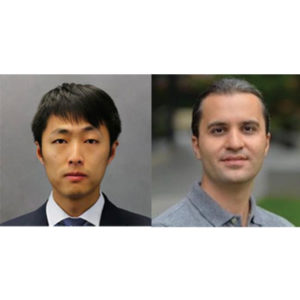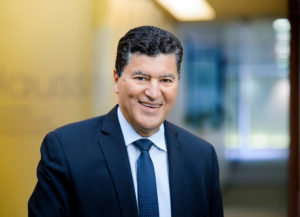
A.I.-Based Decision Support Systems for Precision & Participative Medicine:
Focus on Oncology and Radiomics
Join via Zoom: https://stanford.zoom.us/j/499245954
Abstract:
Precision medicine is the future of health care: please watch the animation at https://vimeo.com/241154708. As a technology-intensive and -dependent medical discipline, oncology will be at the vanguard of this impending change. However, to bring about precision medicine, a fundamental conundrum must be solved: Human cognitive capacity, typically constrained to five variables for decision making in the context of the increasing number of available biomarkers and therapeutic options, is a limiting factor to the realization of precision medicine. Given this level of complexity and the restriction of human decision making, current methods are untenable. A solution to this challenge is multifactorial decision support systems (DSSs), continuously learning artificial intelligence platforms that integrate all available data-clinical, imaging, biologic, genetic, cost-to produce validated predictive models. DSSs compare the personalized probable outcomes-toxicity, tumor control, quality of life, cost effectiveness-of various care pathway decisions to ensure optimal efficacy and economy. DSSs can be integrated into the workflows both strategically (at the multidisciplinary tumor board level to support treatment choice, eg, surgery or radiotherapy) and tactically (at the specialist level to support treatment technique, eg, prostate spacer or not). In some countries, the reimbursement of certain treatments, such as proton therapy, is already conditional on the basis that a DSS is used. DSSs have many stakeholders-clinicians, medical directors, medical insurers, patient advocacy groups-and are a natural consequence of big data in health care. Here, we provide an overview of DSSs, their challenges, opportunities, and capacity to improve clinical decision making, with an emphasis on oncology and radiomics.
About:
Philippe Lambin is a Clinician, Radiation Oncologist, with a PhD in Molecular Radiation Biology, “ERC advanced grant laureate”, co-inventor of Radiomics, multifactorial Decision Support Systems, Distributed learning, the use of immunocytokines with Radiation and pioneer in translational research with a focus on tumour hypoxia and immunotherapy. He is/has been leading 30 clinical trials. He has and is Professor at the University of Maastricht (head of the new Dpt of Precision Oncology: The D-Lab & The M-Lab, focusing on “Convergence Sciences” and Decision Support Systems. He is co-author of more than 488 peer reviewed scientific papers (Hirsch Index: 94 Google scholar), co-inventor of more than 17 patents (filed or submitted) of which 5 are in the (pre)commercialization phase and (co) promoter of more than 59 completed PhD’s.
Refreshments will be provided.

Alex K. Shalek, PhD
Pfizer-Laubach Career Development Associate Professor
Institute for Medical Engineering & Science
Department of Chemistry and Koch Institute
Massachusetts Institute of Technology
Abstract: While several methods exist for sampling tissues in clinical contexts, without high-fidelity tools for comprehensively profiling them, we are both limited in our capacity to understand how constituent cells and their interactions impact prognosis, and to select and develop precision therapeutics. Recent years have witnessed transformative and intersecting advances in nanofabrication and molecular biology that now enable deep profiling of low-input samples. Collectively, these afford new and exciting opportunities to study cellular heterogeneity, starting from the level of the single cell, and may unlock the diagnostic, prognostic, and discovery potential of clinical isolates. Illustratively, I will introduce how we can leverage single-cell genomic approaches – and, in particular, single-cell RNA-Seq – to explore the extensive functional diversity between cells, uncovering, from the “bottom-up,” distinct cell states and their molecular drivers. Moreover, I will discuss high-throughput experimental strategies and demonstrate, in the context of Acute Lymphoblastic Leukemia, how they can be leveraged to achieve the statistical power necessary to reconstruct intracellular circuits, enumerate and redefine cell states and types, and transform our understanding of cellular decision-making in health and disease on a genomic scale.
Bio: Alex K. Shalek is currently the Pfizer-Laubach Career Development Associate Professor at MIT, as well as a Core Member of the Institute for Medical Engineering and Science (IMES), an Associate Professor of Chemistry, and an Extramural Member of The Koch Institute for Integrative Cancer Research. He is also an Institute Member of the Broad Institute, an Associate Member of the Ragon Institute, an Assistant in Immunology at MGH, and an Instructor in Health Sciences and Technology at HMS. His research is directed towards the development and application of new technologies that facilitate understanding of how cells collectively perform systems-level functions in healthy and diseased states. Dr. Shalek received his bachelor’s degree summa cum laude from Columbia University and his Ph.D. from Harvard University in chemical physics under the guidance of Hongkun Park, and performed postdoctoral training under Hongkun Park and Aviv Regev (Broad/MIT). To date, his interdisciplinary research has focused on realizing and utilizing nanoscale manipulation and measurement technologies to examine how small components (molecules, cells) drive systems of vast complexity (cellular responses, population behaviors).

Abstract: Gene editing with CRISPR technology is transforming biology. Understanding the underlying chemical mechanisms of RNA-guided DNA and RNA cleavage provides a foundation for both conceptual advances and technology development. I will discuss how bacterial CRISPR adaptive immune systems inspire creation of powerful genome editing tools, enabling advances in both fundamental biology and applications in medicine. I will also discuss the ethical challenges of some of these applications with a focus on what our decisions now might mean for future generations.
About: MIPS IMAGinING THE FUTURE seminar series is aimed at catalyzing interdisciplinary discussions in all area of medicine and disease. The seminar series is open and free to everyone in the Stanford community, as well as anyone from the surrounding community, companies or institutions. Our next seminar will host Dr. Jennifer Doudna, Professor of Chemistry, Biochemistry & Molecular Biology, &Li Ka Shing Chancellor’s Professor in Biomedical and Health, University of California, Berkeley; for her presentation on the “World of CRISPR: Editing Genomes and Altering Our Future”.
More Information: http://med.stanford.edu/radiology/imagining-the-future.html
Register: https://www.onlineregistrationcenter.com/JenniferDoudna

Integrative Biomedical Imaging Informatics at Stanford (IBIIS) and Center for Artificial Intelligence in Medicine & Imaging (AIMI) Seminar: “AI-Aided Diagnostic and Prognostic Tools for Prostate Cancer”
Okyaz Eminaga, MD, PhD
Postdoctoral Research Fellow, Urology
Biomedical Data Sciences
Stanford University
James H. Clark Center, S360
12:00pm-1:00pm – Seminar and Discussion (light refreshments provided)
Join via Zoom: https://stanford.zoom.us/j/613898274
ABSTRACT: Prostate Cancer exhibits different clinical behavior, ranging from indolent to lethal disease. A critical clinical need is identifying characteristics that distinguish indolent from advanced disease to direct treatment to the latter. The recent renaissance of artificial intelligence (AI) research uncovered the potential of AI to improve clinical decision making. In this seminar, we will go through the potential of AI to enhance the diagnosis and the prognosis of prostate cancer using magnetic resonance images, clinical data, and histology images. We will stress the challenges and benefits of having such AI-based solutions in clinical routine.
ABOUT: Dr. Eminaga passed his medical examination (Staatsexamen) 2009 and received his Ph.D. in Medicine 2010 from University of Muenster (major topic: medical informatics) under the supervision of Professor Dr. Axel Semjonow (one of the pioneer physician-scientists and biomarker researcher who worked on the standardization of PSA measurement for prostate cancer which is used nowadays) and Professor Dr. Martin Dugas (who is the head of European Research Center for Information Systems and one of the most influential professors in medical informatics in Europe). For those who don’t know the institute of medical informatics in Muenster. The systematized Nomenclature of Human and Veterinary Medicine (SNOMED), which is now used worldwide in medical information systems, was initiated by this institute more than 30 years ago.
His doctoral dissertation presented a novel documentation architecture for clinical data and imaging called cMDX (clinical map document) that facilitates the concept of the single-source information system for clinical data storage and analysis, and is successfully used in clinical routine for generating the pathology reports with graphical information about the spatial tumor extent for prostatectomy specimens since 2009 at the prostate center of University Hospital Muenster. This work has been also utilized for more than 20 studies related to genomics, translational medicine, epidemiology, urology, radiology, and pathology. Dr. Eminaga also established the biobanking information management system to manage the samples of one of the largest biobanks for prostate cancer in Europe. This biobank is also part of the European P-Mark network for prostate cancer-related biorepositories initiated by Oxford University.
Dr. Eminaga completed his residency in Urology in the University Hospital of Cologne (Germany) with a major focus on uro-oncology. He was also a research fellow in Prostate Center of University Hospital Muenster, doing research in biomarkers, biobanking infrastructure, epidemiology and histopathology. During his residency fellowship, he further evaluated the role of certain miRNA in prostate cancer development under the supervision of the molecular biologist Dr. Warnecke-Eberz. After his residency, he started a research scholarship at the laboratory of Dr. Brooks, doing genomic research and bioinformatics for research topics related to prostate cancer evolution. Now, his current interests have expanded to statistical learning, medical imaging informatics, and integrative data analysis.
He is the recipient of 3 highly-competitive scholarships and his works have been recognized at national and international levels e.g., by the European Association of Urology. Currently, he is an early-investigator research awardee for prostate cancer managed by the department of defense and works on developing decision-aided tools for diagnosis and prognosis of prostate cancer.
Follow us on Twitter: @StanfordIBIIS and @StanfordAIMI
http://ibiis.stanford.edu/events/seminars/2019seminars.html

“Messaging in the Age of Microtargeting”
John Stafford
Assistant Vice President
Digital Strategy
Stanford University
Bjorn Carey
Senior Director
Digital Strategy
Stanford University
Join via Zoom: https://stanford.zoom.us/j/400566542
Abstract:
Communications has become increasingly data-driven, targeted, and personalized. This has changed how Stanford analyzes communications opportunities from a research perspective and how it engages with relevant audiences. In this presentation, John and Bjorn will share the data and communications strategy underlying three communications initiatives and the resulting execution. They will also provide practical advice for individual thought leadership and communications in this dynamic environment.
About:
John Stafford, MA ’06, is currently Assistant Vice President for Digital Strategy at Stanford, the most senior digital communications role in the university. John is responsible for all aspects of creating a world-class digital communications function: setting the group’s strategy, building analytics and insight programs, counseling on crisis communications, leading multi-channel messaging initiatives, and advising colleagues across the University. He received a Master’s Degree in Communication from Stanford, a B.A. in History from the University of San Francisco, and was a founding advisor to Stanford Medicine X.
Refreshments will be provided.

“Algorithm Development Lifecycle in Medical Imaging:
Current State and Considerations for the Future”
Luciano M. Prevedello, MD, MPH
Vice-Chair for Medical Informatics and Augmented Intelligence in Imaging
Division Chief, Medical Imaging Informatics
Director, 3D and Advanced Visualization Lab
Associate Professor, Division of Neuroradiology,
Department of Radiology
Ohio State University Wexner Medical Center
Join via Zoom: https://stanford.zoom.us/j/267814863
Abstract:
This presentation will describe some of the most important considerations involved in creating algorithms in medical imaging from inception to deployment as well as continued model improvement and/or monitoring. Examples of experience to date from the OSU laboratory for augmented intelligence in imaging will be provided. New paradigms in model creation and the role of image challenge competitions will also be covered. Current issues with model validation and generalizability will also be introduced as well as considerations for future work in this area.
Refreshments will be provided.

“A Deep Learning Framework for Efficient Registration of MRI and Histopathology Images of the Prostate”
Wei Shao, PhD
Postdoctoral Research Fellow
Department of Radiology
Stanford University
“Applications of Generative Adversarial Networks (GANs) in Medical Imaging”
Saeed Seyyedi, PhD
Paustenbach Research Fellow
Department of Radiology
Stanford University
Join via Zoom: https://stanford.zoom.us/j/593016899
Refreshments will be provided
ABSTRACT (Shao)
Magnetic resonance imaging (MRI) is an increasingly important tool for the diagnosis and treatment of prostate cancer. However, MRI interpretation suffers from high interobserver variability and often misses clinically significant cancers. Registration of histopathology images from patients who have undergone surgical resection of the prostate onto pre-operative MRI images allows direct mapping of cancer location onto MR images. This is essential for the discovery and validation of novel prostate cancer signatures on MRI. Traditional registration approaches can be computationally expensive and require a careful choice of registration hyperparameters. We present a deep learning-based pipeline to accelerate and simplify MRI-histopathology image registration in prostate cancer. Our pipeline consists of preprocessing, transform estimation by deep neural networks, and postprocessing. We refined the registration neural networks, originally trained with 19,642 natural images, by adding 17,821 medical images of the prostate to the training set. The pipeline was evaluated using 99 prostate cancer patients. The addition of the images to the training set significantly (p < 0.001) improved the Dice coefficient and reduced the Hausdorff distance. Our pipeline also achieved comparable accuracy to an existing state-of-the-art algorithm while reducing the computation time from 4.4 minutes to less than 2 seconds.
ABSTRACT (Seyyedi)
Generative adversarial networks (GANs) are advanced types of neural networks where two networks are trained simultaneously to perform two tasks of generation and discrimination. GANs have gained a lot of attention to tackle well known and challenging problems in computer vision applications including medical image analysis tasks such as medical image de-noising, detection and classification, segmentation and reconstruction.In this talk, we will introduce some of the recent advancements of GANs in medical imaging applications and will discuss the recent developments of GAN models to resolve real world imaging challenges.

Ron Kikinis, MD
Director of the Surgical Planning Laboratory
Professor of Radiology
Department of Radiology
Brigham and Women’s Hospital
Harvard Medical School
Title: Evolving Health Care from an Artisanal Organization into an Industrial Enterprise
Refreshments will be provided
Join via Zoom: https://stanford.zoom.us/j/996417088
Abstract: During the last decade, results from basic research in the fields of genetics and immunology have begun to impact treatment in a variety of diseases. Checkpoint therapy, for instance has fundamentally changed the treatment and survival of some patients with melanoma. The medical workplace has transformed from an artisanal organization into an industrial enterprise environment. Workflows in the clinic are increasingly standardized. Their timing and execution are monitored through omnipresent software systems. This has resulted in an acceleration of the pace of care delivery. Imaging and image post-processing have rapidly evolved as well, enabled by ever-increasing computational power, novel sensor systems and novel mathematical approaches. Organizing the data and making it findable and accessible is an ongoing challenge and is investigated through a variety of research efforts. These topics will be reviewed and discussed during the lecture.
About:
Dr. Kikinis is the founding Director of the Surgical Planning Laboratory, Department of Radiology, Brigham and Women’s Hospital, Harvard Medical School, Boston, MA, and a Professor of Radiology at Harvard Medical School. This laboratory was founded in 1990. Before joining Brigham & Women’s Hospital in 1988, he trained as a resident in radiology at the University Hospital in Zurich, and as a researcher in computer vision at the ETH in Zurich, Switzerland. He received his M.D. degree from the University of Zurich, Switzerland, in 1982. In 2004 he was appointed Professor of Radiology at Harvard Medical School. In 2009 he was the inaugural recipient of the MICCAI Society “Enduring Impact Award”. On February 24, 2010 he was appointed the Robert Greenes Distinguished Director of Biomedical Informatics in the Department of Radiology at Brigham and Women’s Hospital. On January 1, 2014, he was appointed “Institutsleiter” of Fraunhofer MEVIS and Professor of Medical Image Computing at the University of Bremen. Since then he is commuting every two months between Bremen and Boston.
During the mid-80’s, Dr. Kikinis developed a scientific interest in image processing algorithms and their use for extracting relevant information from medical imaging data. Due to the explosive increase of both the quantity and complexity of imaging data this area of research is of ever-increasing importance. Dr. Kikinis has led and has participated in research in different areas of science. His activities include technological research (segmentation, registration, visualization, high performance computing), software system development, and biomedical research in a variety of biomedical specialties. The majority of his research is interdisciplinary in nature and is conducted by multidisciplinary teams. The results of his research have been reported in a variety of peer-reviewed journal articles. He is an author and co-author of over 350 peer-reviewed articles.
Follow us on Twitter: @StanfordIBIIS

Tessa Cook, MD, PhD
Assistant Professor of Radiology
Perelman School of Medicine
University of Pennsylvania
Title: Deploying AI in the Clinical Radiology Workflow: Challenges, Opportunities, and Examples
Abstract: Although many radiology AI efforts are focused on pixel-based tasks, there is great potential for AI to impact radiology care delivery and workflow when applied to reports, EMR data, and workflow data. Radiology-pathology correlation, identification of follow-up recommendations, and report segmentation can be used to increase meaningful feedback to radiologists as well as to automate tasks that are currently manual and time-consuming. When deploying AI within the clinical workflow, there are many challenges that may slow down or otherwise affect the integration. Careful consideration of the way in which radiologists may expect to interact with AI results should be undertaken to meaningfully deploy radiology AI in a safe and effective way.

Please note this seminar is now cancelled and will be rescheduled for a future date. Please contact Ashley Williams (ashleylw@stanford.edu) with any questions or concerns. Thank you for your understanding!
IMAGinING THE FUTURE: “Journey Through Academia, Government and Industry: Lessons Learned”
Elias Zerhouni, M.D.
Professor Emeritus
John Hopkins University